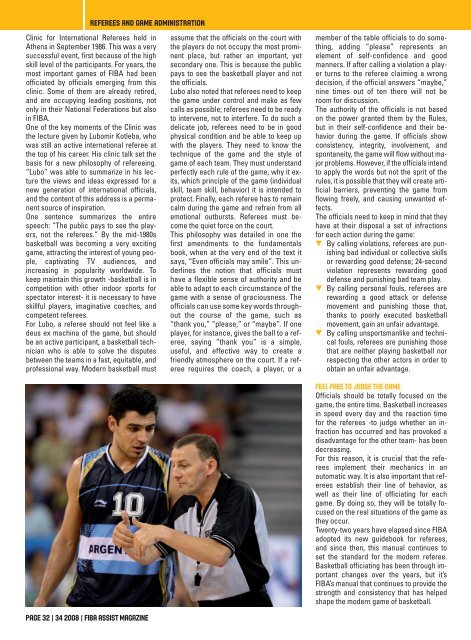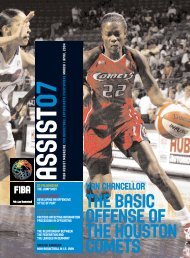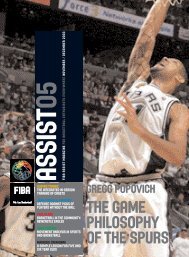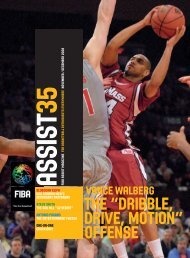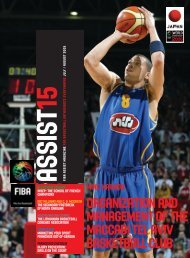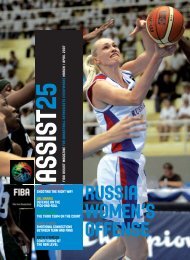“SLICE” AND “POINT” SETS - FIBA.com
“SLICE” AND “POINT” SETS - FIBA.com
“SLICE” AND “POINT” SETS - FIBA.com
You also want an ePaper? Increase the reach of your titles
YUMPU automatically turns print PDFs into web optimized ePapers that Google loves.
eferees and game administration<br />
Clinic for International Referees held in<br />
Athens in September 1986. This was a very<br />
successful event, first because of the high<br />
skill level of the participants. For years, the<br />
most important games of <strong>FIBA</strong> had been<br />
officiated by officials emerging from this<br />
clinic. Some of them are already retired,<br />
and are occupying leading positions, not<br />
only in their National Federations but also<br />
in <strong>FIBA</strong>.<br />
One of the key moments of the Clinic was<br />
the lecture given by Lubomir Kotleba, who<br />
was still an active international referee at<br />
the top of his career. His clinic talk set the<br />
basis for a new philosophy of refereeing.<br />
“Lubo” was able to summarize in his lecture<br />
the views and ideas expressed for a<br />
new generation of international officials,<br />
and the content of this address is a permanent<br />
source of inspiration.<br />
One sentence summarizes the entire<br />
speech: “The public pays to see the players,<br />
not the referees.” By the mid-1980s<br />
basketball was be<strong>com</strong>ing a very exciting<br />
game, attracting the interest of young people,<br />
captivating TV audiences, and<br />
increasing in popularity worldwide. To<br />
keep maintain this growth -basketball is in<br />
<strong>com</strong>petition with other indoor sports for<br />
spectator interest- it is necessary to have<br />
skillful players, imaginative coaches, and<br />
<strong>com</strong>petent referees.<br />
For Lubo, a referee should not feel like a<br />
deus ex machina of the game, but should<br />
be an active participant, a basketball technician<br />
who is able to solve the disputes<br />
between the teams in a fast, equitable, and<br />
professional way. Modern basketball must<br />
page 32 | 34 2008 | Fiba Assist Magazine<br />
assume that the officials on the court with<br />
the players do not occupy the most prominent<br />
place, but rather an important, yet<br />
secondary one. This is because the public<br />
pays to see the basketball player and not<br />
the officials.<br />
Lubo also noted that referees need to keep<br />
the game under control and make as few<br />
calls as possible; referees need to be ready<br />
to intervene, not to interfere. To do such a<br />
delicate job, referees need to be in good<br />
physical condition and be able to keep up<br />
with the players. They need to know the<br />
technique of the game and the style of<br />
game of each team. They must understand<br />
perfectly each rule of the game, why it exits,<br />
which principle of the game (individual<br />
skill, team skill, behavior) it is intended to<br />
protect. Finally, each referee has to remain<br />
calm during the game and refrain from all<br />
emotional outbursts. Referees must be<strong>com</strong>e<br />
the quiet force on the court.<br />
This philosophy was detailed in one the<br />
first amendments to the fundamentals<br />
book, when at the very end of the text it<br />
says, “Even officials may smile”. This underlines<br />
the notion that officials must<br />
have a flexible sense of authority and be<br />
able to adapt to each circumstance of the<br />
game with a sense of graciousness. The<br />
officials can use some key words throughout<br />
the course of the game, such as<br />
“thank you,” “please,” or “maybe”. If one<br />
player, for instance, gives the ball to a referee,<br />
saying “thank you” is a simple,<br />
useful, and effective way to create a<br />
friendly atmosphere on the court. If a referee<br />
requires the coach, a player, or a<br />
member of the table officials to do something,<br />
adding “please” represents an<br />
element of self-confidence and good<br />
manners. If after calling a violation a player<br />
turns to the referee claiming a wrong<br />
decision, if the official answers “maybe,”<br />
nine times out of ten there will not be<br />
room for discussion.<br />
The authority of the officials is not based<br />
on the power granted them by the Rules,<br />
but in their self-confidence and their behavior<br />
during the game. If officials show<br />
consistency, integrity, involvement, and<br />
spontaneity, the game will flow without major<br />
problems. However, if the officials intend<br />
to apply the words but not the sprit of the<br />
rules, it is possible that they will create artificial<br />
barriers, preventing the game from<br />
flowing freely, and causing unwanted effects.<br />
The officials need to keep in mind that they<br />
have at their disposal a set of infractions<br />
for each action during the game:<br />
▼ By calling violations, referees are punishing<br />
bad individual or collective skills<br />
or rewarding good defense; 24-second<br />
violation represents rewarding good<br />
defense and punishing bad team play.<br />
▼ By calling personal fouls, referees are<br />
rewarding a good attack or defense<br />
movement and punishing those that,<br />
thanks to poorly executed basketball<br />
movement, gain an unfair advantage.<br />
▼ By calling unsportsmanlike and technical<br />
fouls, referees are punishing those<br />
that are neither playing basketball nor<br />
respecting the other actors in order to<br />
obtain an unfair advantage.<br />
FEEL FREE TO JUDGE THE GAME<br />
Officials should be totally focused on the<br />
game, the entire time. Basketball increases<br />
in speed every day and the reaction time<br />
for the referees -to judge whether an infraction<br />
has occurred and has provoked a<br />
disadvantage for the other team- has been<br />
decreasing.<br />
For this reason, it is crucial that the referees<br />
implement their mechanics in an<br />
automatic way. It is also important that referees<br />
establish their line of behavior, as<br />
well as their line of officiating for each<br />
game. By doing so, they will be totally focused<br />
on the real situations of the game as<br />
they occur.<br />
Twenty-two years have elapsed since <strong>FIBA</strong><br />
adopted its new guidebook for referees,<br />
and since then, this manual continues to<br />
set the standard for the modern referee.<br />
Basketball officiating has been through important<br />
changes over the years, but it’s<br />
<strong>FIBA</strong>’s manual that continues to provide the<br />
strength and consistency that has helped<br />
shape the modern game of basketball.


